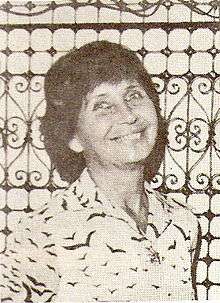María Esther de Miguel
María Esther de Miguel (1 November 1929, Larroque, Entre Ríos Province - Buenos Aires, 27 July 2003) was an Argentinian writer.

Biography
Miguel was the daughter of a Spanish immigrant and Jewish mother. At the age of eight, she won a literary contest in composition at school, which was the beginning of her writing career.[1] In her adolescence, she began writing novellas at the Congregación de los Paulinos in Buenos Aires. Her studies included philosophy and literature, earning a scholarship to study literature in Italy. When she returned to Argentina, she abandoned her Catholic religious vocation, and worked as a teacher and journalist. Miguel served as director of the literary magazine Señales and collaborated in the literary supplement of the newspaper La Nación. She served in a leadership role at the Fondo Nacional de las Artes.
Miguel was married to the editor Andrés Alfonso Bravo. She died of colorectal cancer in 2003.[2]
Selected works
- 1961 "La hora undécima" (novela)
- 1965 "Los que comimos a Solís" (short stories)
- 1970 "Calamares en su tinta" (novela)
- 1972 "En el otro tablero" (short stories)
- 1973 "Pueblamérica" (novela) - republished in 1998 with the title "Violentos jardines de América"
- 1980 "Espejos y daguerrotipos" (novela)
- 1983 "Jaque a Paysandú" (novela)
- 1986 "Dos para arriba, uno para abajo" (short stories)
- 1991 "Norah Lange" (biography)
- 1993 "La amante del restaurador" (novela)
- 1995 "Las batallas secretas de Belgrano" (novela)
- 1996 "El general, el pintor y la dama" (novela)
- 1997 "En el otro lado del tablero " (short stories)
- 1999 "Un dandy en la corte del rey Alfonso" (novela)
- 2001 "El palacio de los patos" (novela)
Awards
- Premio Emecé (for La hora undécima)
- Premio del Fondo Nacional de las Artes (for Los que comimos a Solís)
- Segundo Premio Municipal (for Los que comimos a Solís)
- Premio Municipal (for Espejos y daguerrotipos)
- Premio Planeta (for El general, el pintor y la dama)
- Premio Nacional de Literatura
- Palma de Plata of the Pen Club
- Konex Award
- Premio Dupuytrén
References
- "Murió María Esther de Miguel, una de las escritoras más leídas" (in Spanish). Clarin. 28 July 2003. Retrieved 5 June 2016.
- Friera, Silvina (28 July 2003). "La escritora que bajó del bronce la vida y la obra de los próceres" (in Spanish). Pagina 12. Archived from the original on July 3, 2007. Retrieved 5 June 2016.CS1 maint: unfit url (link)
Bibliography
- Clarmi Bueno Zandona: Una mirada sobre la obra de María Esther de Miguel. Universidad de les Illes Balears, Palma 2000.
- Malva E. Filer: Las nuevas „traduciones“ de María Esther de Miguel. In: Alba de América, Bd. 3 (1985); Nr. 4/5, pages 98–104.
- Eduardo Romano (Hrsg.): Héctor Tizón. Germán Rozenmacher, Abelardo Castillo, María Esther de Miguel. Kapellusz, Buenos Aires 1987, ISBN 950-13-2242-4 (Narradores argentinos; 2).